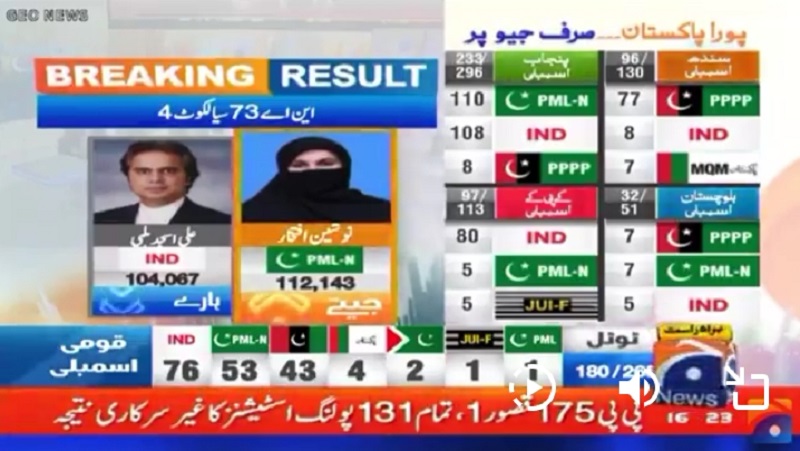Pakistan elections: Imran Khan's 'independents' leading but without a majority
After more than 24 hours, vote counting continues to be slow, and charges of fraud are being made. Candidates linked to the jailed former prime minister are leading in more constituencies than candidates for Nawaz Sharif. A coalition government appears most likely to get the country out of its current crisis. Fr Khalid Rashid Asi, “you can't force voters”. In a tense climate, whoever wins must take “concrete steps to build and maintain peace in the country.”
Faisalabad (AsiaNews) – More than a day after polls closed in Pakistan, all official results are not in yet from all electoral districts, a delay that is fuelling suspicions, but not enough to counter the failure of Nawaz Sharif's Pakistan Muslim League-Nawaz (PML-N) to secure the broad success it had hoped for; on the contrary, “independent" candidates linked to Imran Khan's Pakistan Tehreek-e-Insaf (PTI) seem to be winning more National Assembly races.
Khan, a former prime minister who lost a confidence vote in 2022, is now in prison serving multiple sentences for a total of 31 years.
At present, since no party appears to be close to a majority to govern alone, a coalition government is the most likely scenario in a country marred by a deep political crisis.
The latest results from the Election Commission of Pakistan as reported by local broadcaster GeoTV concern 191 seats out of 266. Some 78 have gone to “independents”, 56 to Sharif’s PML-N, and 43 to Bilawal Bhutto's Pakistan Peoples Party.
However, the picture remains very fluid, with charges of fraud and claims of inconsistency flying around over unofficial results that give PTI-linked candidates a lead in more constituencies. For this reason, fears of unrest are growing.
Fr Bonnie Mendes, a leading figure in Pakistan’s Catholic community, spoke to AsiaNews about the vote.
“No matter what the polls predicted the election, results tell honestly whom the people chose. After more than 12 hours, results are not clear yet, but what seems clear is that the voters do not want a dictatorship.”
Ultimately, voters “choose whom they like. Many PTI candidates standing as independents have won. Political parties have not done well. However, we are still waiting for official results,” he added.
While “Imran Khan is behind bars, we stand by his vision against corruption," said Munawar Masih, a vegetable vendor and a PTI supporter.
“Our candidates were not allowed the (cricket) ‘bat’ as their election symbol, so they contested with different symbols which were given to them just four days before the elections. But PTI voters stood firm with the party and voted with true zeal, this is our right to vote for any party or any candidates and we have shown our decision. No one nor fear can stop us.”
"In Punjab, the PML-N seemed to be firmly in power," said Fr Khalid Rashid Asi, director of the Justice and Peace Commission of the Diocese of Faisalabad, "but we have seen many PML-N pillars fall after people voted against them. The results that are coming in tell us clearly that you can't force voters, you can't buy their votes,” he added.
“I visited many polling stations in my area yesterday and I witnessed a large number of women came out of their homes to vote for their favourite parties; even many minority voters have shown their trust in the PTI and voted for independent candidates.”
“It’s evident that the democratic spirit has prevailed with a remarkable turnout, particularly notable among women and youth voters,” said Farwa Aamer, who heads the Asia Society Policy Institute's South Asia initiatives in New York.
“Despite facing formidable hurdles, including the loss of their electoral symbol and the detention of key leaders, former Prime Minister Imran Khan's party, Pakistan Tehreek-e-Insaf (PTI), has demonstrated resilience, leveraging social media effectively to maintain a prominent lead.”
Still, “it is essential to recognise that no government formation can proceed without considering the intricate dynamics involving the country's influential military establishment.”
Now, “one pertinent question arises: will there be a reassessment of the military's stance towards Khan, or might alternative avenues be explored to shape the outcome? With the alleged vote tampering, overnight flip in results disfavouring candidates originally in the lead, and overall delays in results being announced support the latter.
“Pakistan's sizeable voter base is keenly attuned to the electoral process and demands transparency and authenticity in the results, especially with telecommunication shutdowns and pre-poll events that have sparked some suspicion already. Any deviation from these principles risks inciting public discontent and jeopardising the stability of the democratic transition.”
Fr Khalid Rashid Asi is also looking with concern at the next few hours. “I see a coalition government after the final results of the elections,” but “I can guess that there can be an emergency situation because many people will not accept the results, so, the government should take concrete steps to build and maintain peace in the country.”
At the same time, he wonders why “the internet and mobile phone services were off. What was that [for]? Election results have been delayed. These are the old tactics to rig the elections but the masses will not allow the stealing of the mandate they registered with their decision.”
The clergyman just wants “peace in the country and the coming government should take serious steps for economic stability and work on health and education,” he added.
29/02/2024 20:15
26/07/2018 18:39







.png)










